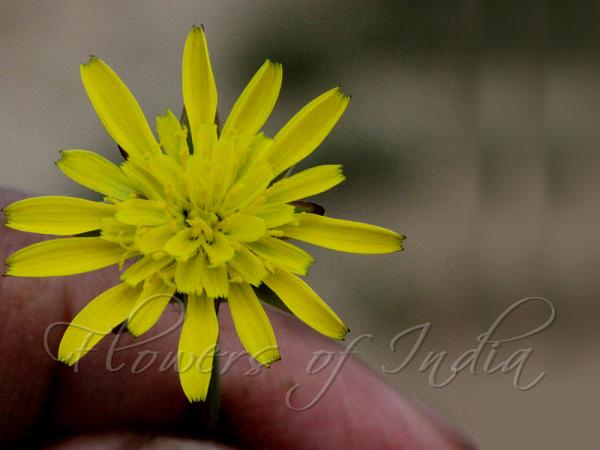|
| Himalayan Viper Grass |
|

|

| File size | 152939 |
| Original date | 5/17/12 8:40 AM |
| Resolution | 1000 x 750 |
| Flash | Flash did not fire, auto |
| Focal length | 100.0mm |
| Exposure time | 1/125s |
| Aperture | 22.0 |
| Focus Distance | |
| Metering Mode | Multi-segment |
| Camera make | Canon |
| Camera model | Canon EOS 550D |
| Sensor type |
|
|
|
|
Photo: |
Botanical name: Scorzonera virgata Family: Asteraceae (Sunflower family)
Synonyms: Scorzonera nuristanica, Scorzonera divaricata
Synonyms: Scorzonera nuristanica, Scorzonera divaricata
Himalayan Viper Grass is a perennial herb with a
stout, woody rootstock. Stems are 10-80 cm tall, rarely simple or
paniculately branched, sometimes many branched from the base, slender,
erect, grooved. Leaves are crowded at the base of stem, long,
thread-like with incurved margins, 5-30 x 0.1-0.4 cm, hairless,
stalkless, sheathed at the base. Flower-heads are broadly cylindric or
bell-shaped; 2-3.5 x 0.5-0.8 cm, erect, on a long stalk. Stalk is
slender, long, usually naked, rarely with few bracts. Outer involucral
bracts brownish or pale green, ovate or ovate-heart-shaped, 3-7 x 2-4
mm, unequal; inner linear-lanceshaped or oblong-lanceshaped, 10-20 x
4-6 mm. Florets are yellow, usually 5-toothed. Achenes are pale yellow
or pale brownish, lanceshaped, subcompressed, 12-15 mm long, many
ribbed, often with a strong median rib, smooth, striped. Pappus is
feathery, pale white or yellowish or pale brown, 8-12 mm long.
Himalayan Viper Grass is found in W. Himalayas on dry open slopes and
moist slopes amidst grasses, at altitudes of 2500-4500 m, Jammu &
Kashmir and Himachal Pradesh, Mongolia and W. Tibet. Flowering:
June-September.
| Identification credit: Gurcharan Singh | Photographed in Pampore Karewas, Kashmir. |
• Is this flower misidentified? If yes,